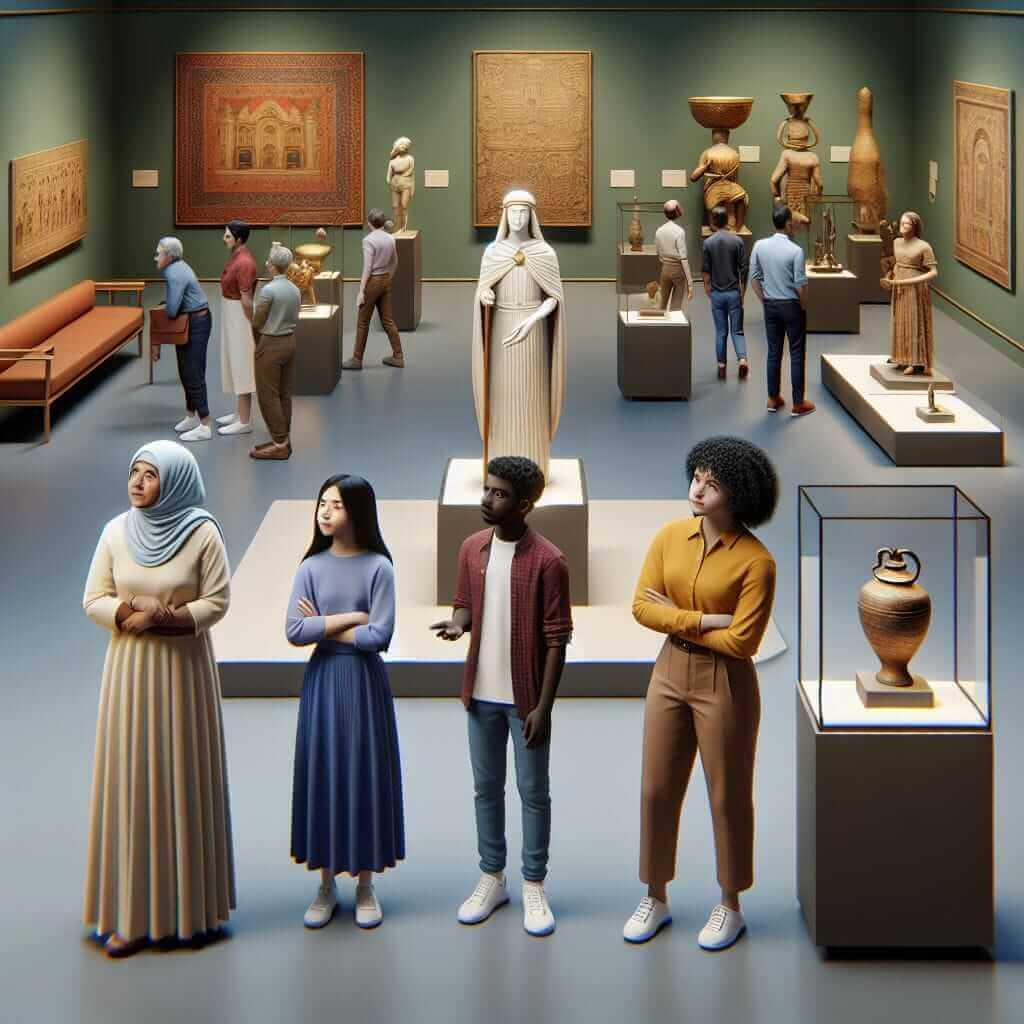The role of museums in educating the public is a topic that frequently arises in IELTS Writing Task 2. It delves into the societal impact of these institutions and their significance beyond mere repositories of artifacts. This essay will provide insights into crafting a high-scoring response to such prompts, analyze a sample essay, and offer useful vocabulary to enhance your writing.
Here are some potential essay questions related to this topic:
- Some people argue that museums should primarily entertain visitors, while others believe their main function is education. Discuss both views and give your opinion.
- Museums are an important part of our cultural heritage. How do museums educate the public about the past and present?
- In the age of technology and readily available information online, are museums still relevant in educating the public? Discuss your views.
Sample Essay: Museums – More Than Entertainment, A Cornerstone of Education
To what extent do you agree or disagree with the statement: Museums should focus more on educating visitors than on providing entertainment?
Museums, repositories of history and culture, are often perceived as spaces for both education and entertainment. While the latter undoubtedly attracts a wider audience, I firmly believe that the primary role of museums should be to educate, with entertainment serving as a complementary tool.
Firstly, museums house invaluable artifacts and exhibits that offer unparalleled insights into the past. From ancient civilizations to modern art, these tangible connections to history possess immense educational value. Interactive displays, detailed descriptions, and guided tours further enhance the learning experience, providing context and depth that mere entertainment cannot replicate. For instance, a visit to a natural history museum can impart knowledge about evolution, biodiversity, and environmental concerns far more effectively than a documentary or a textbook.
Furthermore, museums foster critical thinking and cultural understanding. By showcasing diverse perspectives and narratives, they challenge preconceived notions and encourage visitors to engage with different cultures and ideologies. This is particularly crucial in today’s interconnected world, where fostering empathy and understanding between different communities is paramount. For example, art museums exhibiting works from various cultures can broaden perspectives and promote appreciation for artistic expressions beyond one’s own background.

While entertainment certainly has its place in attracting visitors, prioritizing it over education risks trivializing the museum’s core function. Interactive exhibits, while engaging, should not overshadow the dissemination of accurate historical and cultural information. Similarly, while temporary exhibitions catering to popular interests can generate revenue, museums must remain committed to curating permanent collections that reflect their educational mission.
In conclusion, museums play a pivotal role in educating the public by providing access to historical artifacts, fostering cultural understanding, and promoting critical thinking. While entertainment can complement these objectives, it should not overshadow the museum’s primary educational purpose. By prioritizing education, museums can continue to inspire, enlighten, and empower generations to come. (Word count: 295)
Analysis of the Essay
The essay follows a clear structure:
- Introduction: This paragraph introduces the topic, paraphrases the question, and clearly states the writer’s opinion.
- Body Paragraph 1: This paragraph argues for the importance of education in museums, providing examples and supporting details.
- Body Paragraph 2: This paragraph further strengthens the argument by highlighting how museums promote cultural understanding and critical thinking.
- Body Paragraph 3: This paragraph acknowledges the opposing viewpoint (entertainment) but argues against it being the priority.
- Conclusion: The conclusion summarizes the main points and reiterates the writer’s opinion in a concise manner.
Writing Tips for This Topic
- Vocabulary: Utilize a wide range of vocabulary related to museums, education, and culture.
- Examples: Support your arguments with specific examples of museums, exhibitions, or artifacts.
- Balance: Acknowledge both sides of the argument (education vs. entertainment) even if you strongly agree with one side.
- Relevance: Keep your arguments focused on the role of museums and avoid going off-topic.
Vocabulary
- Repository (noun) /rɪˈpɒzɪtəri/ – a place where things are stored or kept safely
- Artifact (noun) /ˈɑːtɪfækt/ – an object made by a human being, typically of cultural or historical interest
- Invaluable (adjective) /ɪnˈvæljuːəbl/ – extremely useful or valuable
- Tangible (adjective) /ˈtændʒəbl/ – perceptible by touch; real or actual, rather than imaginary or visionary
- Interactive (adjective) /ˌɪntərˈæk.tɪv/ – involving communication between people
- Fostering (verb) /ˈfɒs.tər.ɪŋ/ – encouraging the development or growth of something
- Critical thinking (noun) /ˌkrɪt.ɪ.kəl ˈθɪŋ.kɪŋ/ – the objective analysis and evaluation of an issue in order to form a judgment
- Preconceived notions (noun) /ˌpriː.kənˈsiːvd ˈnoʊ.ʃənz/ – an opinion formed beforehand without adequate evidence
- Trivializing (verb) /ˈtrɪv.i.ə.laɪ.zɪŋ/ – make (something) seem less important, significant, or complex than it really is.
Conclusion
Discussing the role of museums in public education offers a rich landscape for exploring various perspectives. By incorporating a strong vocabulary, compelling arguments, and relevant examples, you can craft a compelling essay that showcases your IELTS writing skills. Remember to practice writing on similar topics to improve your fluency and confidence.